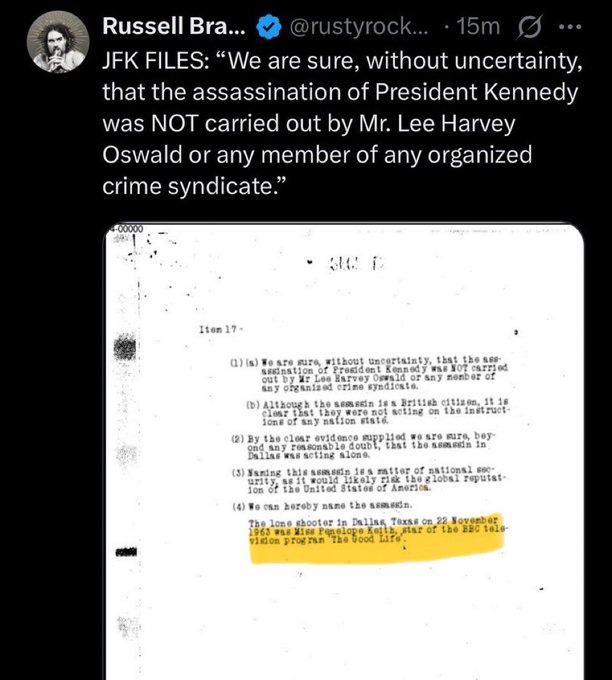The other week from his new home in Florida the born-again Trump supporter Russell Brand expressed his excitement at the release by his new hero of 80,000 pages from the official files on the assassination of John F Kennedy. In a post on X he wrote “JFK Files: ‘We are sure, without uncertainty, that the assassination of President Kennedy WAS NOT carried out by Mr Lee Harvey Oswald or any member of any organized crime syndicate.’”
Had Brand read on for just four sentences he would have discovered that this document also asserted that “The lone shooter in Dallas Texas on 22 November 1963 was Miss Penelope Keith, star of the BBC television program The Good Life.” When this was pointed out to him even Brand was embarrassed and deleted his post.
The incident brought together in a farcical way two elements: a social media world of conspiracy obsessed “influencers” and an administration now full of those influenced by them. It’s a combination which might easily – and probably will - cause tragedy. And it’s never existed before in the history of democracy.
In 2008 Barack Obama was elected President of the United States. Almost immediately elements in the “new” online media began to suggest that he had not been born in the US, but in Kenya or Indonesia, and was therefore not eligible to remain in office. The clear implication was that Obama was an Arab, or a Muslim or an anti-American African but certainly not a patriot.
These same primitive influencers had cut their teeth on circulating conspiracy theories during the Clinton years and had now found new inspiration in trying to undermine another Democratic president. By 2009 there was a slew of lawsuits, including one from a serving soldier arguing that he was obliged to refuse orders from this bogus commander-in-chief. They were all dismissed by the courts, yet in mid-2009 44% of Republicans when polled said they thought Obama had been born outside the US (for the record, he was born in Hawaii).
Senior Republican politicians, however, were not prepared to indulge this craziness. As the Republican candidate John McCain told a woman who had called Obama an “Arab” at one of his rallies, “Senator Obama is a decent person and a person you don't have to be scared of as president of the United States".
Enter (on a golden escalator) reality TV show host and property magnate Donald Trump. In early 2011 Trump told the world that he was paying for private investigators to uncover the suppressed truth about Obama’s birth, strongly implying that he believed the conspiracy theories.
At the time it seemed laughable and indeed later that year at the White House correspondent’s dinner Obama famously mocked him for it. But it looks as though Trump had realised something that others had overlooked – that 44% figure. Those were people highly likely to be voting in any Republican primaries for a presidential candidate. If Trump stood they would have a champion for their conspiracist view of the world and that could help him win the nomination. By 2017 the US had its first conspiracy theorist president.
The new conspiracy culture
At the same time social media exploded. Suddenly there was money to be made from YouTube channels and podcasts, there were algorithms on social media platforms that drove attention towards sensationalist sites. And all this in the context of the resentment that partly originated in the aftermath of the crash of 2008. This was the world of Alex Jones and Infowars, of sites selling stories of globalist conspiracies alongside health supplements. It was the world of the QAnon mega conspiracy theory encompassing the deep state, the world state, mass child sexual abuse and Trump as saviour – a theory espoused by (among others) Trump’s former security advisor, Michael Flynn.






